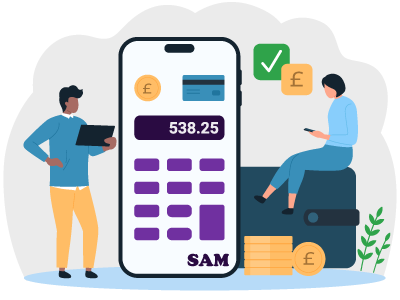Selling a Help to Buy Property
Selling a property bought with a Help to Buy equity loan can seem more complicated than a standard sale, but the process is manageable with the right guidance.
While the first five years of the loan were interest-free, most homeowners now face interest payments. This means that a sale is not only a way to move on, but also an opportunity to pay off the loan and simplify your finances.
This article will give you a clear, step-by-step breakdown of the process for selling a Help to Buy property. We'll cover everything from the required RICS valuation to getting an offer approved by Homes England.
We also explain what happens if you're selling a Help to Buy property at a loss, and when it might be a good idea to repay the loan before you sell.
What is the process for selling a Help to Buy property?
You can sell a Help to Buy property on the open market like any other property. However, because you have an outstanding equity loan, the process is different from a standard sale.
The loan must be repaid in full from the proceeds of the sale, and Homes England must approve the transaction. Here is a detailed, step-by-step guide to the Help to Buy selling process:
- 1
Get a Surveyor's Valuation Report
You must instruct a Homes England-compliant RICS surveyor to value your property. This is important because the valuation is used to calculate the repayment amount of your equity loan.
The report is only valid for three months, and you must send it to Homes England within five working days of its issue.
- 2
Instruct Your Solicitor
You'll need a solicitor with experience in selling a house with Help to Buy. They will manage the legal and administrative process of the sale, ensuring the equity loan is repaid correctly and all of Homes England's requirements are met.
- 3
Administration Fees and Application Form
You must pay any outstanding arrears on your equity loan and a £200 administration fee to Homes England. Your solicitor will help you fill out and submit the repayment application form, which authorises Homes England to speak to your solicitor about the sale. This is required before the repayment process can move forward.
- 4
Receive the Redemption Letter
Once Homes England has approved your valuation and application, they will send a redemption letter to your solicitor. This letter confirms the exact amount you owe, including any accrued interest. It also contains the legal undertaking documents your solicitor needs.
- 5
Your Solicitor Provides a 'Legal Undertaking'
Your solicitor will provide a legal guarantee to Homes England that the loan will be repaid in full from the sale proceeds on the date of completion.
- 6
Homes England Issues the 'Authority to Complete'
This final document confirms that all the necessary conditions have been met and the sale can proceed. You cannot complete without this. Next, the sale completes, and the equity loan is repaid from the proceeds. Any remaining funds are then transferred to you.
Once the loan is paid, Homes England will apply to the Land Registry to remove the charge on your property.
- Local, RICS-accredited surveyors for Help to Buy valuations.
- Homes England-compliant reports.
- Fixed, competitive fees with no hidden costs.
- Experts in refreshing expiring Help to Buy valuations.
- Great availability and fast turnaround times.
- Direct access to a dedicated professional.
- We can solve any property challenge.

How is the Help to Buy loan repayment calculated?
A common misconception is that you repay the fixed amount you originally borrowed from Homes England. However, the loan is an equity share, not a fixed sum.
The amount you repay is a percentage of the current market value of your home when you sell.
This means if your property's value has increased, you will repay more than you originally borrowed. But, and this is a key point, if your property's value has decreased, you will repay less than you originally borrowed. This also applies if you are selling a Help to Buy property at a loss.
The final repayment amount is based on either:
- The market value of your home, as determined by the RICS valuation, or
- The price you sell the home for, whichever is higher.
An example of repaying with a loss
Let's say you bought a house for £200,000 with a 20% Help to Buy loan (£40,000). If you now sell the property for £180,000, your repayment is calculated from the lower sale price. You would pay back 20% of the new value:
20% of £180,000 = £36,000
In this scenario, you would pay back £4,000 less than the original loan amount, as the loan absorbed a portion of the loss. This is a vital piece of information for anyone worried about selling a house with Help to Buy in a falling market.
Is Help to Buy coming back?
The Help to Buy scheme ended back in 2023, and there has been much speculation on its return, or similar schemes being implemented, in 2025 and onwards.
Is it better to pay off Help to Buy before selling?
When you sell a Help to Buy property, you will have to repay the equity loan regardless. However, you can choose to repay the loan as a separate transaction before you list the property.
- The sale is simpler and faster. If you pay off the loan before completion, the property is no longer considered a Help to Buy property. This means you avoid the extra administrative steps and delays of getting approval from Homes England.
- It stops interest from accumulating. If you are past the initial five-year interest-free period, paying off the loan stops the interest from accumulating, potentially saving you a significant amount.
- You can repay at a fixed valuation. If you are selling in a falling market, you can repay the loan based on a valuation from before you listed the property for sale. The longer you wait, the more the value could fall, but it could also go up.
- It requires extra costs and administration. You will still have to pay for a separate Homes England-compliant valuation and a solicitor to handle the repayment. This is an additional process and cost.
Ultimately, this decision depends on your personal financial situation. Always get professional advice to decide what is right for you.
What happens to the mortgage when selling a Help to Buy home?
When you sell a Help to Buy property, your existing mortgage must be paid off. You will use the proceeds from the sale to pay off your mortgage lender, and the remaining funds will be used to repay Homes England.
You can't transfer your loan to another property, so it will have to be repaid from the proceeds before you buy your next home.
You have a few options for your new mortgage when you buy your next property:
- Porting your mortgage: You can ask your current lender if you can "port" your existing mortgage to your new property. This allows you to keep the same interest rate and terms. However, your lender will need to re-evaluate your finances and approve you for the new property.
- Getting a new mortgage: You can get a new mortgage with a new or existing lender. This is often necessary if you cannot port your current mortgage, or if a better deal is available elsewhere.
Be aware of any early repayment charges (ERCs) on your existing mortgage. If you have to pay off your mortgage before the end of its term, your lender may charge a fee. This is a key cost to factor into your calculations when selling.
The downside of Help to Buy
The main benefit of a Help to Buy equity loan was getting on the property ladder with a smaller deposit. However, the scheme has a key downside that becomes more relevant the longer you keep the loan.
The core issue is that your costs can rise over time, which may be a key reason you are now looking to sell. The two main factors are:
- The interest rate increases annually. The loan is interest-free for the first five years. However, from the sixth year onwards, interest is charged at an initial rate of 1.75%, which rises every year. This means your monthly payments will continue to climb as long as you have the loan.
- The amount you owe is not fixed. The repayment is a percentage of your home's current market value, not a fixed sum. If your home's value increases, so does the amount you owe to Homes England. While this is a benefit if your home value falls, over the long term, rising house prices mean you could end up repaying significantly more than you originally borrowed.
- Help to Buy RICS Valuations.
- Remortgaging or selling advice.
- Fixed-fee, no-obligation quotes.
- On 99% of mortgage lender panels.
- Rated 'Excellent' on Trustpilot.
- Solving all your property challenges.

Caragh is an excellent writer and copy editor of books, news articles and editorials. She has written extensively for SAM for a variety of conveyancing, survey, property law and mortgage-related articles.
Andrew started his career in 2000 working within conveyancing solicitor firms and grew hands-on knowledge of a wide variety of conveyancing challenges and solutions. After helping in excess of 50,000 clients in his career, he uses all this experience within his article writing for SAM, mainstream media and his self published book How to Buy a House Without Killing Anyone.









